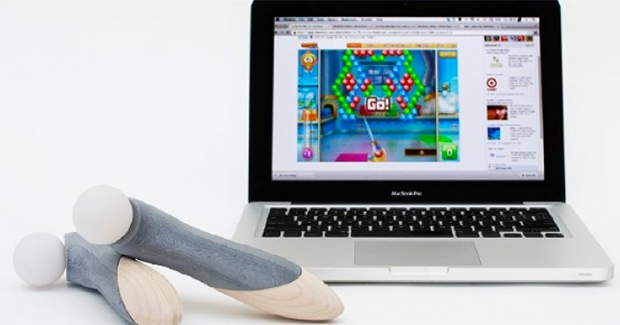Cerebral palsy patients test Canadian researchers’ virtual rehabilitation system
Canadian researchers developed an at-home virtual rehabilitation system for people with weakness on one side of their body, then tested it in a two-month-long cerebral palsy related clinical trial – Functional Engagement in Assisted Therapy Through Exercise Robotics (FEATHERS).
The study was recently published in the Games for Health Journal.

Mike Van der Loos, Department of Mechanical Engineering, Peter Wall Institute for Advanced Studies, University of British Columbia
Patricia Inacio PhD, Cerebral Palsy News Today March 18, 2018
The team talked with those who tried the motion capture-based system, their physical therapists, and engineers involved in the project to come up with conclusions on how well it worked, how much participants used it, and what could be done to improve it.
They concluded that technical problems dampened participants’ and therapists’ enthusiasm for the system and prevented participants from sticking with it. They also concluded that ads that popped up during the Facebook video games that were at the heart of the system hurt the rehabilitation effort’s chance of success. Still another conclusion was that the video game fare needs to be adjusted over time to keep the rehabilitation challenging.
Those who tested the tool included seven adults and three adolescents with hemiparesis, a condition that involves weakness on the entire length of one side of the body. The condition usually stems from cerebral palsy, a brain injury or stroke.
Researchers assembled a team of engineers, therapists and others to help create the system.
“Our objective was to identify factors affecting the use of the system to inform future virtual rehabilitation research, based on feedback from participants with hemiparesis secondary to stroke, brain injury, and cerebral palsy, as well as research team therapists and engineers,” the team wrote.
They named the system FEATHERS, for Functional Engagement in Assisted Therapy through Therapy Robotics. It consists of a PlayStation Eye camera that’s similar to a webcam, two PlayStation Move controllers, and a computer running Microsoft Windows.
Participants used the system to play Facebook videogames for 30 minutes a day, five days a week, for two months. Technical people adapted the system to each participant’s movement skills.

An earlier version of the FEATHERS bimanual controllers (above), which use a laptop to play online games, was updated with better button arrangement before in-home testing began with patients in October. The controllers use electronic components similar to a commercial Play Station Move controller, with a completely redesigned shell. University of British Columbia
Once a week the participants called the researchers to report on their experience with the system, including how much they were using it. This communication gave the team a grasp of how confident the participants felt about using the system and how motivated they were to keep using it their treatment.
Participants’ use of the system depended on three factors, participants decided. One was technology. This included the system’s hardware and software designs, the characteristics of the games and their therapy implications, and whether the system was easy to use.
Another factor was communication among those involved in the study, including their preferences and how effective communication was.
The third factor was participants’ and therapists’ ability to use the system. This covered such things as their familiarity with Facebook, the time it took for them to master the system, and the need for them to convey therapy-related information remotely.
One conclusion that researchers reached was that it was important to keep the participants’ rehabilitation work challenging, since most made progress from week to week. Another conclusion was that pop-up ads and in-game purchase requests were frustrating distractions that hurt the therapy process.
Still another conclusion was that technical problems prevented participants from sticking with the therapy, decreasing its chance of success.
The researchers also learned that participants preferred communicating by telephone rather than Facebook.
“More training in the use of the Facebook application and reinforcement of the available communication channels may help to improve access to support,” the team wrote.
Another conclusion was that therapists needed more help to become familiar with how the system operated and how it can be used in rehabilitation.
“Affording time for therapists to make clinical observations of participants throughout the intervention period through video conferencing or periodic home visits is also necessary to enhance clinical decision-making,” the researchers said.
“Lessons learned from this study can inform future clinical and implementation research using commercial video games and social media platforms,” they concluded.
 Source Cerebral Palsy News Today
Source Cerebral Palsy News Today
| References |
Application of Commercial Games for Home-Based Rehabilitation for People with Hemiparesis: Challenges and Lessons Learned, Valdés BA, Glegg SMN, Lambert-Shirzad N, Schneider AN, Marr J, Bernard R, Lohse K, Hoens AM, Van der Loos HFM. Games Health J. 2018 Jun;7(3):197-207. doi: 10.1089/g4h.2017.0137. Epub 2018 Mar 22.
| Functional Engagement in Assisted Therapy Through Exercise Robotics. FEATHERS is an acronym for Functional Engagement in Assisted Therapy Through Exercise Robotics. We have assembled an integrated knowledge-technology-client team to develop a novel robot-based home therapy program for children with hemiplegic cerebral palsy and older persons post-stroke. We propose to combine low-cost robotic devices, videogames, a bimanual training program, social media frameworks such as Facebook, and on-line performance sharing between therapy clients and their therapists. UBCFeathers. Youtube Jul 11, 2014 |
Also see
Therapeutic robotics one step closer to in-home use Peter Wall Institute for Advanced Studies, University of British Columbia
The Ability Hacks: The story of two hackathon teams embracing the transformative power of technology Microsoft
